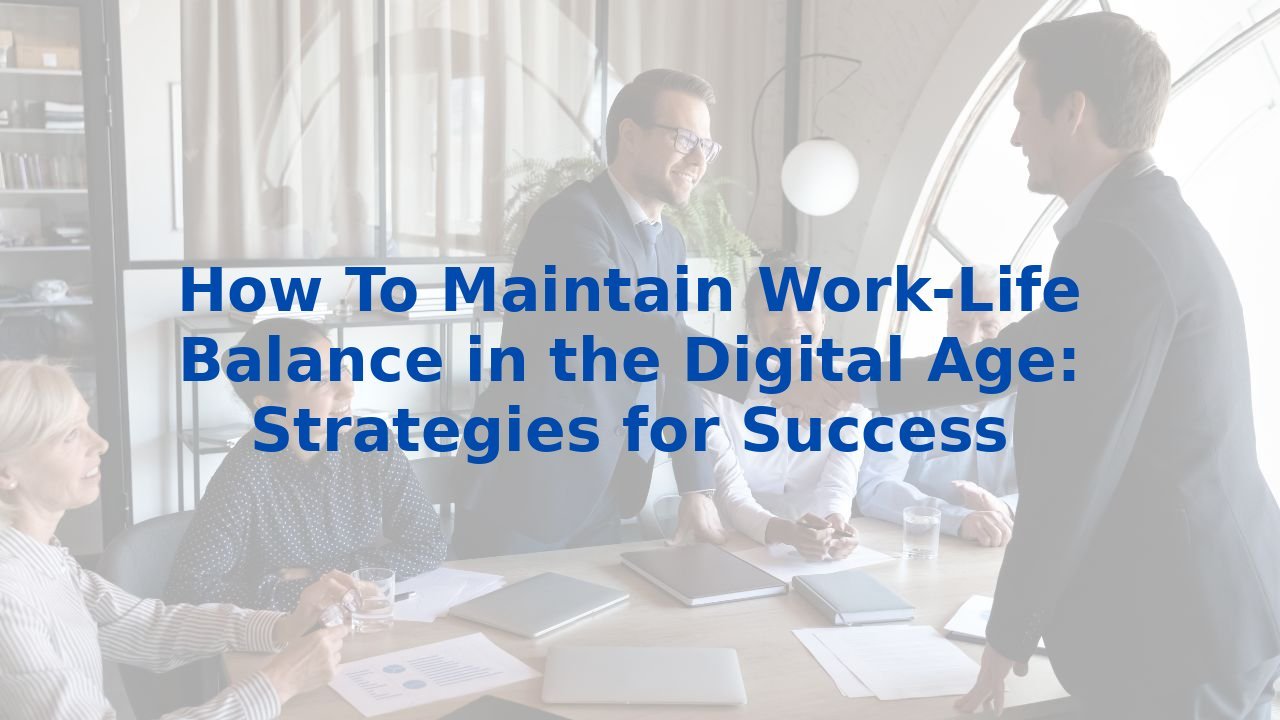How To Maintain Work-Life Balance in the Digital Age: Strategies for Success
How To Maintain Work-Life Balance in the Digital Age: Strategies for Success
In the ever-accelerating world of technology, maintaining work-life balance can feel more like a juggling act than a sustainable practice. Yet, finding this balance is vital not just for personal well-being but also for organizational success. As we navigate through the complexities of our digital lifestyles, artificial intelligence (AI) emerges as a powerful ally in achieving that equilibrium.
The Challenge of Work-Life Balance
Work-life balance has become one of the paramount struggles of modern professionals. The relentless demands of digital connectivity often blur the lines between work and personal time, leading to stress, burnout, and decreased productivity. Unchecked, this cycle can lead to negative impacts not only on individual health and well-being but also on organizational effectiveness.
How AI Can Enhance Efficiency
AI technologies present an incredible opportunity to enhance efficiency within organizations, enabling employees to reclaim balance in their lives. Here’s how:
“AI serves as a powerful tool to streamline processes, reduce workloads, and create a more dynamic work environment.”
1. Automation of Repetitive Tasks
One of the primary benefits of AI is its ability to automate routine tasks, from data entry to scheduling. By offloading repetitive and time-consuming responsibilities, employees can focus on higher-value work that requires creativity and critical thinking, nourishing their skill sets and engagement levels.
2. Data Analysis and Insights
AI can process and interpret vast data sets at unprecedented speeds. Instead of spending countless hours on data analysis, teams can receive actionable insights that inform strategic decisions. This efficiency allows for thoughtful planning without the burden of heavy data crunching.
3. Customer Service and Support
AI-powered tools such as chatbots enhance customer service by providing 24/7 support. This not only reduces the pressure on human representatives but also allows them to dedicate their time to solving more complex issues, further strengthening customer relationships.
4. Predictive Maintenance
For industries reliant on machinery, AI aids in forecasting maintenance needs and mitigating downtime. By anticipating when equipment is likely to fail, organizations can streamline operations, freeing up employees to focus on their core duties without worrying about unexpected interruptions.
5. Enhanced Collaboration
AI facilitates seamless collaboration across teams by providing instant feedback and project management assistance. This leads to better teamwork and improved workflows, aligning everyone towards common goals without added stress.
Benefits of Training Employees for AI
To fully tap into AI's potential, organizations must invest in training employees. Here’s how such an approach can transform workplace dynamics:
1. Improved Productivity
Equipping employees with AI skills enhances their ability to work more efficiently. With a clearer understanding of AI technologies, teams can leverage these tools for maximum output and minimal effort.
2. Enhanced Creativity
Training in AI not only provides technical skills but also boosts creativity. Armed with new tools and insights, employees are better positioned to devise innovative solutions, enriching their contributions to the organization.
3. Better Decision-Making
Employees familiar with AI can interpret insights more effectively, leading to enhanced decision-making capabilities. This results in decisions that can drive organizational growth and adaptability.
4. Increased Job Satisfaction
Creating a workforce knowledgeable in AI fosters a sense of value and empowerment. Employees who feel equipped to excel in their roles are generally more satisfied, leading to higher retention rates.
5. Competitive Advantage
Investing in AI training positions organizations ahead of the competition. Companies that foster an AI-savvy culture are better equipped to adapt and innovate, thereby achieving sustainable success.
Conclusion
In an age where the lines between work and life can easily blur, leveraging AI tools offers a pathway toward a balanced professional experience. By automating mundane tasks and providing actionable insights, AI empowers employees to focus on what truly matters — their growth and the impact they create. Moreover, investing in employee training for AI not only uplifts productivity but also enhances job satisfaction, crafting a harmonious work environment.
As we embrace the transformative power of AI, organizations can foster a space where efficiency and balance coexist, paving the way for a more sustainable future.



